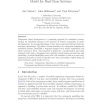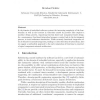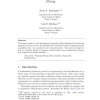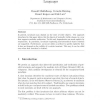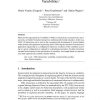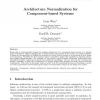109
click to vote
ENTCS
2006
15 years 1 months ago
2006
Component based development is a promising approach for embedded systems. Typical for embedded software is the presence of resource constraints in multiple dimensions. An essentia...
107
click to vote
ENTCS
2006
15 years 1 months ago
2006
In the domain of embedded software systems the increasing complexity of the functionality as well as the increase in variations caused by product lines requires a modular design p...
86
Voted
ENTCS
2006
15 years 1 months ago
2006
This paper reports on the development of specific slicing techniques for functional programs and their use for the identification of possible coherent components from monolithic c...
ENTCS
2006
15 years 1 months ago
2006
Industry is looking to create a market in reliable "plug-and-play" components. To model components in a modular style it would be useful to combine event-based and state...
108
Voted
ENTCS
2006
15 years 1 months ago
2006
We introduce the notion of functional stream derivative, generalising the notion of input derivative of rational expressions (Brzozowski 1964) to the case of stream functions over...
131
click to vote
ENTCS
2006
15 years 1 months ago
2006
Components allow to design applications in a modular way by enforcing a strong separation of concerns. In distributed systems this separation of concerns have to be composed with ...
106
click to vote
ENTCS
2006
15 years 1 months ago
2006
In general, invariants may depend on the state of other objects. The approach introduced in this paper allows this for objects of mutually visible classes, in a way that supports ...
ENTCS
2006
15 years 1 months ago
2006
Means for the representation of variability in UML 2.0 interactions, as presented in a previous work, are further formalised and given a mathematically formal semantics. In this w...
96
Voted
ENTCS
2006
15 years 1 months ago
2006
Being able to systematically change the original architecture of a component-based system to a desired target architecture without changing the set of functional requirements of t...
71
Voted
ENTCS
2006
15 years 1 months ago
2006
We define and use a SOS-based framework to specify the transition systems of calculi with name-passing properties. This setting uses proof-theoretic tools to take care of some of ...
